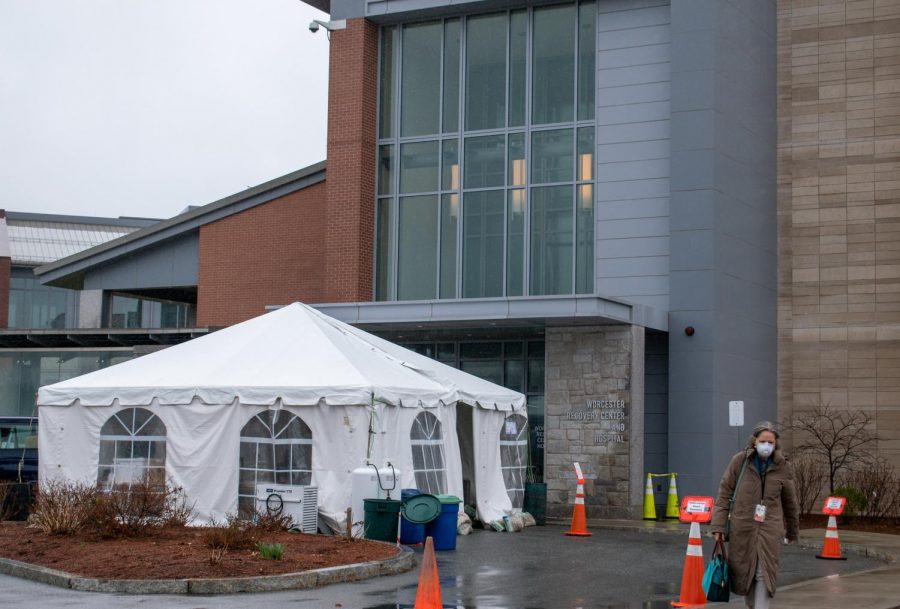Researchers at the University of Massachusetts have designed face shields to be mass-produced and donated to health care workers and first responders, according to a press release by UMass News and Media Relations.
Designed with the help of engineers, nurses and other health care professionals, the face shields will be sent to health care workers and first responders from around the area before mid-April, just as the virus is peaking, said the Institute for Applied Sciences Director Peter Reinhart.
“Once the COVID-19 crisis hit, we developed a number of COVID-19 response teams,” said Reinhart.
The Institute, which focuses on “[facilitating] translational and interdisciplinary research,” worked together with other departments to create face shields. Associate Professor Frank Sup and Assistant Professor Meghan Huber, both of the department of mechanical and industrial engineering, have been leading the research for designing personal protective equipment.
“They took the challenge on to create a face shield that was inexpensive and could be worn over glasses and other masks like N95 masks,” said Reinhart.
One of the major goals was to design face shields that were flat, since the shields have a three-dimensional shape that isn’t space-efficient when shipped.
Additionally, these face shields are cheaper than most other models, which usually cost about $5, Reinhart said.
“Our face shields cost about 40 cents,” he noted. “We’ve had volunteers dropping them off to various regional hospitals, hospices, clinics, nursing homes, anyone that has a need, we’ve been making our face shields available to them.”
The design will be made available by Southbridge company K+K Thermoforming. The company is mass-producing an order of 80,000 shields placed by the Face Shield COVID-19 Response Team at UMass Amherst, the press release stated.
K+K Thermoforming “says it will continue production based on demand,” Reinhart also added in the release.
Students and other members of the UMass community can go on the Institute for Applied Sciences’ website and order face shields for themselves which will be given to them through “contactless delivery,” Reinhart also said.
The press release also describes how UMass has been working to help healthcare workers by supplying them with equipment ranging from face shields to ventilator parts to equipment that can be used to transport virus tests.
“Given the number of requests we receive on a daily basis, we know the need is dire. They’re in crisis mode, that’s why we’re working so quickly,” said Huber.
Ph.D. nursing student Ellen Smithline says the opportunity to collaborate with others on the COVID-19 face shield response team gave nurses a chance to be represented.
“It was a wonderful experience. It was a collaboration where everyone had the same goal. It was to protect those who needed to be protected,” said Smithline.
Those who worked on designing the face shields mostly worked remotely, and many of the workers have never met in person.
Smithline, who was originally set to graduate in May, has been a nurse for 35 years and an emergency nurse for the last 26. She previously worked to fight other outbreaks such as Ebola and SARS.
“I’ve been through every other infectious disease issue in my career. As an emergency nurse you are the frontline for this. We were always the ones screening people,” she said. “I’ve used my education and the life of an emergency nurse for the face shield team.”
Smithline’s experience gave her insight into how face shields should be designed to withstand the movements of nurses and protect them.
“If I’m moving, I want to know that the face shield will stay in place. My face shield is my security blanket. I need to know it’s going to be there when I need it for the whole time,” said Smithline. We can’t do the social distancing of six feet. We’re bathing, we’re suctioning, we’re caring and providing comfort.”
Aspects which aren’t usually taken into account with face shield designs, such as hair, were an important part of the design, according to Smithline.
“Long hair can be put in a ponytail, which impacts the fit which they used a strap to lengthen it. There are also populations that have natural hairstyles. That’s not necessarily something that’s thought about,” she said. “I believe that by looking at other designs there may not have been nursing involvement.”
Smithline currently works at the Springfield isolation tents for the shelter population which takes care of “[shelter] people who have been exposed to or who are COVID-19 positive.”
Health care workers there use donated UMass face shields to help give the shelter population “a safe place.” The shields, Smithline said, are “functioning so well.”
Maria Elena Little Endara can be reached at [email protected].




















